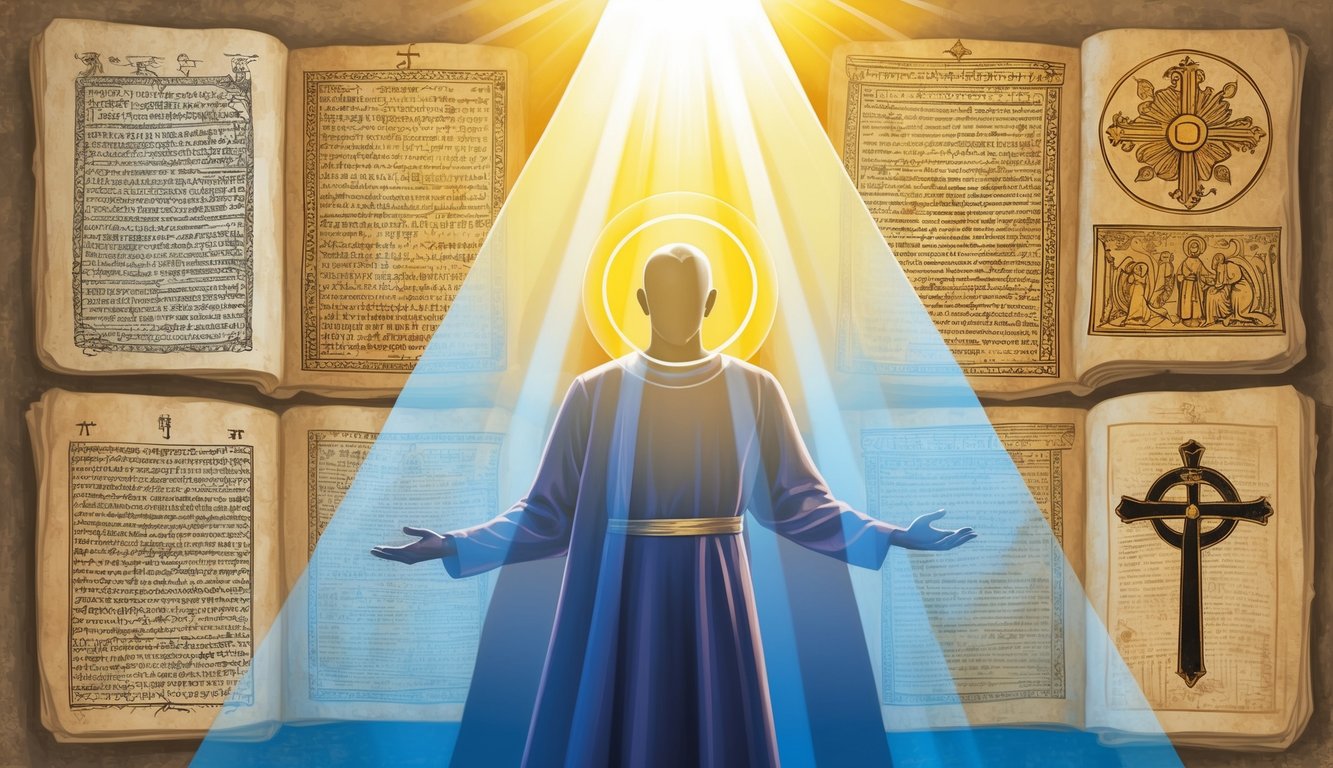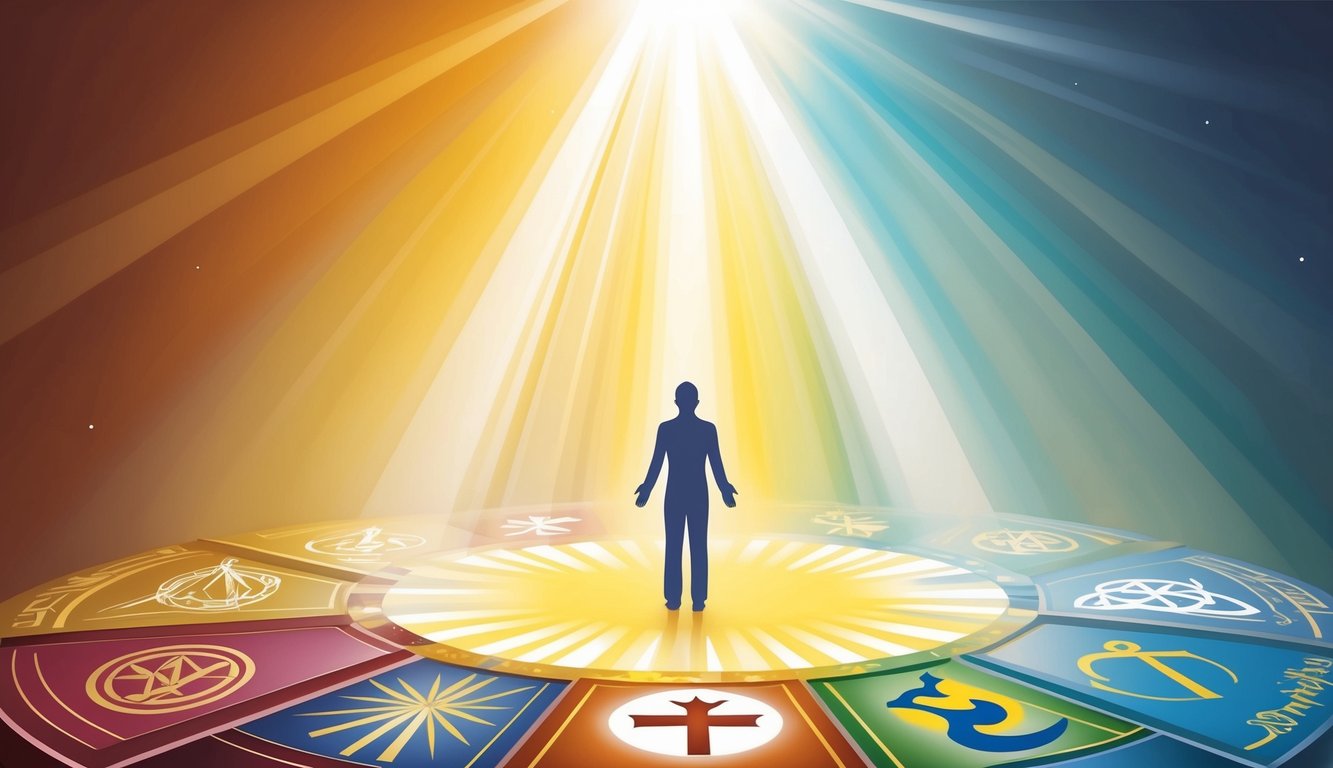Don’t Miss Out On This Unique Astrological Opportunity
Are you tired of spinning your wheels and getting nowhere? Simply put, you’re out of sync: you’re out of alignment with your astral configuration.
But: there’s a kind of map that can help you reclaim your alignment. Think of it as your own personal blueprint to success and happiness: a blueprint that will help you live your most amazing life.
Get started here.
Are God and Jesus Christ the same person? This question has puzzled many, as it taps into deep theological discussions within Christianity.
Christian belief states that God and Jesus Christ are distinct but united in the concept of the Trinity.
The Trinity includes God the Father, Jesus the Son, and the Holy Spirit.
This idea might seem complex, and that’s why it’s intriguing to dive deeper into how these relationships are explained through various teachings and scriptures.
You might wonder why understanding this is important for your faith journey.
Knowing the relationship between God and Jesus can enrich your spiritual experience and understanding of Christian doctrine.
Exploring different viewpoints and interpretations can also help you see how these beliefs have developed over centuries.
By exploring this topic, you’ll uncover insights about who God and Jesus are within Christianity.
Engaging with these ideas can open your perspective and deepen your knowledge of the faith you may hold dear.
Understanding the Concept of the Trinity
The Trinity is a core belief in Christianity, presenting God as three distinct persons: God the Father, God the Son, and God the Holy Spirit.
This concept emphasizes both the unity and uniqueness of each divine person.
Trinity Explained
You may have heard of the Trinity being described as one God in three persons.
This means that God exists as God the Father, God the Son (Jesus Christ), and God the Holy Spirit.
Each person is fully divine and possesses all the qualities of God.
This doctrine is rooted in the Bible, where instances hint at this concept, such as Jesus’ baptism when all three were present.
Early Christians worked hard to understand how God could be one yet three, which led to the doctrine we have today.
This teaching helps explain how Jesus can be recognized as fully God.
Unity in the Trinity
Despite being three distinct persons, the Trinity means that there is only one God.
The term “unity” highlights this oneness.
You can think of it like three people sharing one essence or being.
They act in perfect harmony, and this unity is central to the belief.
This unity is important because it shows how God interacts with the world.
God the Father creates, God the Son saves, and God the Holy Spirit guides.
Each role is unique but connected.
This helps you understand how Christians see God working in different aspects of life while remaining one divine being.
The Divinity of Jesus Christ
Understanding the divinity of Jesus Christ is fundamental to Christian beliefs.
Exploring how Jesus is seen as God the Son, supported by scriptural references, and explaining His dual nature as both human and divine are key to grasping His divine role.
Jesus as God the Son
In Christian theology, Jesus is recognized as God the Son, one part of the Holy Trinity.
This concept suggests that Jesus holds the same divine essence as God the Father, emphasizing His divinity.
Jesus’ miracles, teachings, and resurrection affirm His divine nature and mission as the Savior.
Through His life, Jesus exemplified divine qualities like omniscience and holiness, reinforcing His identity as Lord and Savior, distinct yet unified with God.
Scriptural References to Jesus’ Divinity
Several passages in the New Testament highlight Jesus’ divine nature.
For instance, the Gospel of John begins by identifying Jesus as the eternal Word, stating, “In the beginning was the Word, and the Word was with God, and the Word was God” (John 1:1-3).
This underscores His divine titles, such as Messiah and Son of God.
Paul’s letters often reference Jesus’ exalted status and role in salvation, further affirming His divinity and unity with God the Father and the Holy Spirit.
The Humanity and Divinity of Jesus
While Jesus is divine, He also embraced human nature.
This dual existence allows Him to connect intimately with humanity while carrying out divine purposes.
Born of the Virgin Mary, Jesus lived a human life, experiencing human emotions, struggles, and joys.
Yet, He remained free from sin, showcasing His divine nature.
This unique combination of human and divine aspects allowed Jesus to act as a perfect bridge between God and mankind, ultimately offering salvation through His sacrifice on the cross.
The balance of His divine and human natures is central to His identity and mission.
Expressions of the Divine Relationship

In Christianity, the relationship between God and Jesus Christ is depicted through various expressions.
These reveal a deep connection, blending imagery and teachings about their unity and shared purpose.
Father and Son Imagery
The imagery of God as the Father and Jesus as the Son is central to understanding their relationship.
This concept is rooted in the Bible, where Jesus often refers to God as Father, highlighting a familial bond.
This relationship is portrayed in the New Testament, most notably in John 10:30, where Jesus states, “I and the Father are one.”
This imagery conveys not just a title but a profound connection marked by love and authority.
The Bible illustrates how Jesus is obedient to the Father, aligning His will with God’s. This Father-Son bond exemplifies care, guidance, and divine purpose, offering believers an image of closeness and understanding between God and Jesus Christ.
This relationship serves as a model for believers, encouraging them to trust in God’s wisdom and direction.
Understanding the Matthew 6:21 meaning reinforces this idea, reminding individuals that their hearts will follow what they truly treasure.
By valuing this divine relationship, followers of Christ can deepen their faith and align their lives with God’s purpose.
Expressions of Unity
Expressions of unity between God and Jesus focus on their oneness in purpose and essence.
In John 10:30, the statement “I and the Father are one” underscores their united role in the divine plan.
This unity is not just about shared goals but also involves a shared divine nature, as shown in Christian teachings.
The Old Testament lays a foundation for such unity, echoed in how Jesus fulfills prophecies and reveals God’s love.
Revelation teaches that Jesus is both distinct and integral to God’s plan.
This mysterious yet intimate unity invites believers to reflect on how God and Jesus work in harmony, leading to spiritual understanding and transformation.
Historical and Theological Perspectives

In exploring the question of whether God and Jesus Christ are the same person, various historical and theological perspectives are considered.
The beliefs and debates that arose throughout history, especially within early Christianity, have shaped current understandings.
Defining Orthodox Beliefs
Orthodox Christianity holds the view that Jesus and God are distinct yet unified in the Holy Trinity. Orthodox beliefs are rooted in the notion of one God in three persons: the Father, the Son (Jesus), and the Holy Spirit.
This understanding asserts that while Jesus is God’s incarnation, He also retains divine and human nature, emphasizing both his divinity and humanity.
The attributes of God, such as omniscience and omnipotence, are believed to be fully present in Jesus as well.
These beliefs have been reinforced by various councils and theological teachings to maintain consistency within the faith.
Debates and Heresies
Throughout history, different beliefs have challenged the orthodox views, leading to debates and accusations of heresy.
One major debate was around modalism, which suggested that God and Jesus are not distinct persons but rather different modes of the same person.
This was opposed by orthodox theologians for diluting the Trinity’s distinct aspects.
Other heretical views considered Jesus a mere prophet and not divine, or only divine, dismissing his human form.
Such debates involved influential groups, including the Pharisees during Jesus’s time, who often questioned his divine claims.
The Nicene Creed
The Nicene Creed emerged as a cornerstone of early Christian doctrine, specifically to clarify and assert Jesus’s divine nature.
Created during the Council of Nicaea in 325 AD, this creed emphasized Jesus as “true God from true God.”
It played a pivotal role in countering controversial theological positions and unifying Christian belief across different regions.
It reinforced the understanding of Jesus and God’s relationship in the context of the Trinity.
The creed continues to be a vital statement of faith in many Christian traditions, providing a framework that honors the complexity of Jesus’s identity within Christian theology.
Each of these perspectives and debates has contributed to the intricate understanding of the nature and identity of God and Jesus, reflecting centuries of theological development.
Implications of Belief in the Oneness of God and Jesus

Believing that God and Jesus Christ are the same person can deeply affect aspects of Christian faith and daily life.
These beliefs can shape your understanding of salvation, prayer, and how you live out your faith.
Faith and Salvation
When you accept that God and Jesus are one, it can transform your idea of salvation.
Jesus’ sacrifice and resurrection hold a powerful place in this belief.
You see Jesus as an ultimate advocate, bridging the gap between God and humanity.
This view often emphasizes that salvation and eternal life are accessible through belief in Jesus.
It underscores God’s love and power, offering redemption from sin.
The oneness concept highlights that understanding God’s nature through Jesus can lead you to a closer relationship in faith and prayer.
Reflections in Christian Living
This belief can influence daily behavior and decisions.
Seeing Jesus as both God and a personal savior encourages a focus on love and sacrifice in your actions.
It often calls for living with compassion, inspired by Jesus’ teachings.
You may find that this perspective enhances your commitment to prayer and spiritual practices.
Recognizing Jesus’ role in creation and redemption strengthens the sense of purpose and unity among believers.
By embracing this oneness, you strive to follow Jesus’ example, fostering a deeper connection with others and a stronger faith journey.



